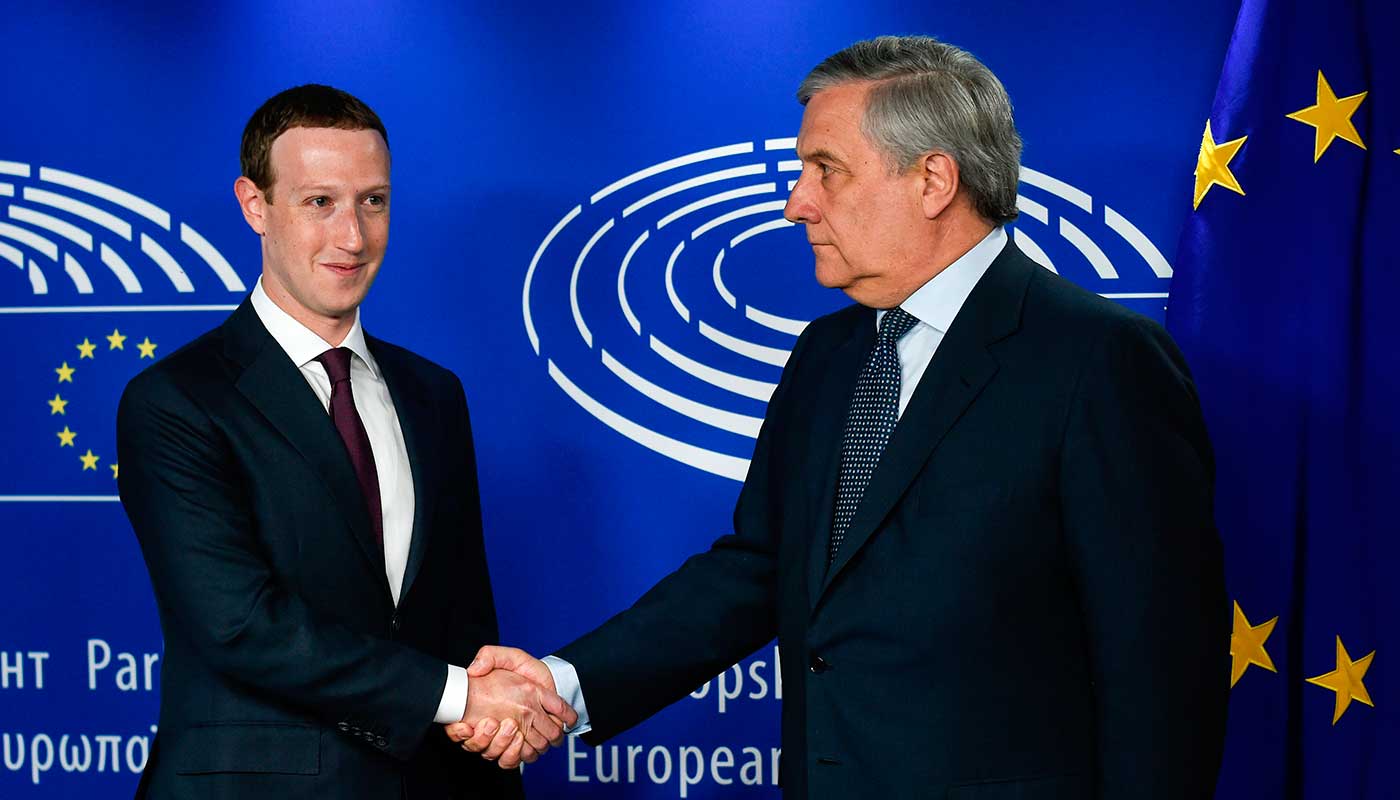What we learned from Mark Zuckerberg’s European parliament appearance
Facebook founder accused of dodging questions in 90-minute session

A free daily email with the biggest news stories of the day – and the best features from TheWeek.com
You are now subscribed
Your newsletter sign-up was successful
Facebook chief executive Mark Zuckerberg has apologised to a panel of MEPs in Brussels for his company’s role in the Cambridge Analytica data scandal, and for the proliferation of fake news on its platform.
However, several MEPs expressed frustration and disappointment, accusing Zuckerberg of dodging a number of questions during his 90-minute meeting with the panel.
“I asked you six yes and no questions. I got not a single answer,” Green party politician Philippe Lamberts told Zuckerberg.
The Week
Escape your echo chamber. Get the facts behind the news, plus analysis from multiple perspectives.

Sign up for The Week's Free Newsletters
From our morning news briefing to a weekly Good News Newsletter, get the best of The Week delivered directly to your inbox.
From our morning news briefing to a weekly Good News Newsletter, get the best of The Week delivered directly to your inbox.
CNN says the setup of the meeting “was largely to blame”, with the format leaving Zuckerberg free to pick and choose which questions he would answer.
Unlike his recent appearance before US lawmakers in April, where Zuckerberg and politicians engaged in a series of back and forth exchanges, the EU meeting followed a different format.
The BBC explains that “the leaders of the European Parliament's various political groups each asked several questions apiece”, leaving Zuckerberg to wait “until they were all delivered before responding”.
This is the preferred method of holding such meetings at the European Parliament.
A free daily email with the biggest news stories of the day – and the best features from TheWeek.com
Still, The Guardian says, several things did come through in the Facebook founder's testimony including the fact that Zuckerberg attempted “to make it clear that he is very, very sorry” about how his platform has been used.
“Whether it’s fake news, foreign interference in elections or developers misusing people’s information, we didn’t take a broad enough view of our responsibilities,” Zuckerberg said. “That was a mistake, and I’m sorry.”
However, the session was most notable for what wasn't covered. When it concluded, Zuckerberg indicated to the panel that Facebook would provide written answers to some of its other concerns, saying: “I realise there were a lot of specific questions that I didn’t get around to answer.”
Chair of the Commons digital, culture, media and sport select committee, Damian Collins, called the meeting a “missed opportunity for proper scrutiny” of the social media platform.
“Questions were blatantly dodged on shadow profiles, sharing data between WhatsApp and Facebook, the ability to opt out of political advertising, and the true scale of data abuse on the platform,” Collins said.
-
 6 of the world’s most accessible destinations
6 of the world’s most accessible destinationsThe Week Recommends Experience all of Berlin, Singapore and Sydney
-
 How the FCC’s ‘equal time’ rule works
How the FCC’s ‘equal time’ rule worksIn the Spotlight The law is at the heart of the Colbert-CBS conflict
-
 What is the endgame in the DHS shutdown?
What is the endgame in the DHS shutdown?Today’s Big Question Democrats want to rein in ICE’s immigration crackdown
-
 Epstein files topple law CEO, roil UK government
Epstein files topple law CEO, roil UK governmentSpeed Read Peter Mandelson, Britain’s former ambassador to the US, is caught up in the scandal
-
 Iran and US prepare to meet after skirmishes
Iran and US prepare to meet after skirmishesSpeed Read The incident comes amid heightened tensions in the Middle East
-
 Israel retrieves final hostage’s body from Gaza
Israel retrieves final hostage’s body from GazaSpeed Read The 24-year-old police officer was killed during the initial Hamas attack
-
 China’s Xi targets top general in growing purge
China’s Xi targets top general in growing purgeSpeed Read Zhang Youxia is being investigated over ‘grave violations’ of the law
-
 Panama and Canada are negotiating over a crucial copper mine
Panama and Canada are negotiating over a crucial copper mineIn the Spotlight Panama is set to make a final decision on the mine this summer
-
 Why Greenland’s natural resources are nearly impossible to mine
Why Greenland’s natural resources are nearly impossible to mineThe Explainer The country’s natural landscape makes the task extremely difficult
-
 Iran cuts internet as protests escalate
Iran cuts internet as protests escalateSpeed Reada Government buildings across the country have been set on fire
-
 US nabs ‘shadow’ tanker claimed by Russia
US nabs ‘shadow’ tanker claimed by RussiaSpeed Read The ship was one of two vessels seized by the US military